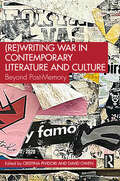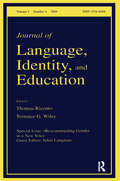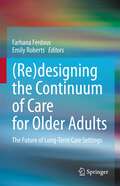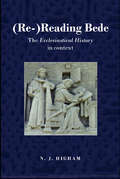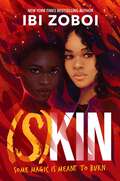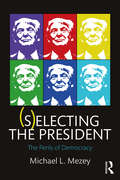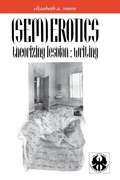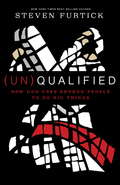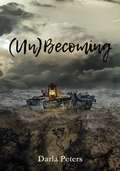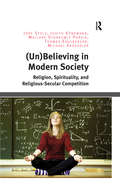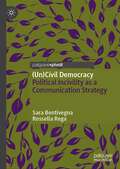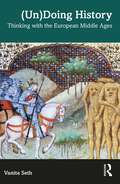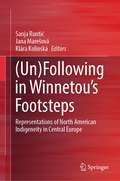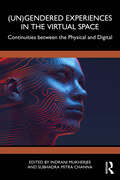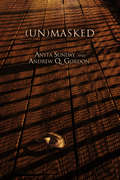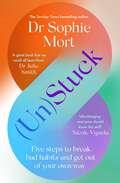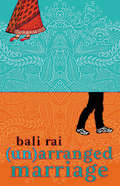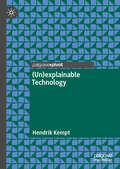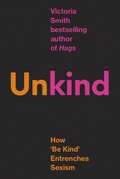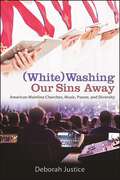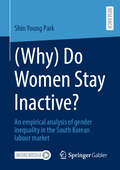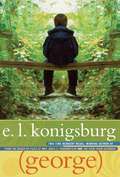- Table View
- List View
(Re)Visualizing National History
by Robin OstowIdeas regarding the role of the museum have become increasingly contentious. In the last fifteen years, scholars have pointed to ways in which states (especially imperialist states) use museums to showcase looted artefacts, to document their geographic expansion, to present themselves as the guardians of national treasure, and to educate citizens and subjects. At the same time, a great deal of attention has been paid to reshaping national histories and values in the wake of the collapse of the Communist bloc and the emergence of the European Union. (Re)Visualizing National History considers the wave of monument and museum building in Europe as part of an attempt to forge consensus in politically unified but deeply divided nations.This collection explores ways in which museums exhibit emerging national values and how the establishment of these new museums (and new exhibits in older museums) reflects the search for a consensus among different generational groups in Europe and North America. The contributors come from a variety of countries and academic backgrounds, and speak from such varied perspectives as cultural studies, history, anthropology, sociology, and museum studies. (Re)Visualizing National History is a unique and interdisciplinary volume that offers insights on the dilemmas of present-day European culture, manifestations of nationalism in Europe, and the debates surrounding museums as sites for the representation of politics and history.
(Re)Writing War in Contemporary Literature and Culture: Beyond Post-Memory
by Cristina Pividori and David Owen(Re)Writing War in Contemporary Literature and Culture: Beyond Post-Memory is an exploration of war narratives through the lens of postmemory, offering a critical re-evaluation of how contemporary literature and cultural products reshape our understanding of past conflicts. This volume presents a rich tapestry of perspectives, drawing from an array of conflicts and incorporating insights from international experts across various disciplines, including contemporary literature, film studies, visual arts, and cultural studies. It critically builds upon and extends Marianne Hirsch's concept of postmemory, engaging with complex themes like the ethical dimensions of war writing, the authenticity of representations, and the creative power of art in reimagining traumatic events. This study not only challenges traditional boundaries in war literature and memory studies but also resonates with contemporary concerns about societal engagement with violent pasts, making it a significant addition to scholarly discourse and essential reading for those interested in the intersection of history, memory, and literature.
(Re)constructing Gender in a New Voice: A Special Issue of the Journal of Language, Identity, and Education
by Thomas Ricento Terrence G. WileyThe articles in this special issue examine the relationship between gender identity and second language learning from a variety of perspectives, all of which share a basic grounding in sociocultural theories of learning and poststructural theories of language. (Re)constructing Gender in a New Voice presents a range of approaches to questions regarding the role of gender identity in a set of distinct local contexts. In this issue, Guest Editor Juliet Langman contends that an examination of the tensions between past and current ways of expressing identity will allow for continued theorizing on the nature of gender identity and its role in multiple language learning and use.
(Re)designing the Continuum of Care for Older Adults: The Future of Long-Term Care Settings
by Farhana Ferdous Emily RobertsThis book broadens the visioning on new care environments that are designed to be inclusive, progressive, and convergent with the needs of an aging population. The contents cover a range of long-term care (LTC) settings in a single collection to address the needs of a wide audience.Due to the recent COVID-19 pandemic, rethinking the spatial design of care facilities in order to prepare for future respiratory and contagious pathogens is one of the prime concerns across the globe, along with social connectedness and autonomy in care settings. This book contributes to the next generation of knowledge and understanding of the growing field of the design of technology, programs, and environments for LTC that are more effective in infection prevention and control as well as social connectedness. To address these issues, the chapters are organized in four sections: Part I: Home- and community-based care; Part II: Facility-based care; Part III: Memory care and end-of-life care; and Part IV: Evidence-based applied projects and next steps. (Re)designing the Continuum of Care for Older Adults: The Future of Long-Term Care Settings is an essential resource for researchers, practitioners, educators, policymakers, and students associated with LTC home and healthcare settings. With diverse topics in theory, substantive issues, and methods, the contributions from notable researchers and scholars cover a range of innovative programming, environments, and technologies which can impact the changing needs and support for older adults and their families across the continuum of care.
(Re-)Reading Bede: The Ecclesiastical History in Context
by N.J. HighamBede's Ecclesiastical History is the most important single source for early medieval English history. Without it, we would be able to say very little about the conversion of the English to Christianity, or the nature of England before the Viking Age. Bede wrote for his contemporaries, not for a later audience, and it is only by an examination of the work itself that we can assess how best to approach it as a historical source. N.J. Higham shows, through a close reading of the text, what light the Ecclesiastical History throws on the history of the period and especially on those characters from seventh- and early eighth-century England whom Bede either heroized, such as his own bishop, Acca, and kings Oswald and Edwin, or villainized, most obviously the British king Cædwalla but also Oswiu, Oswald's brother. In (Re-)Reading Bede, N.J. Higham offers a fresh approach to how we should engage with this great work of history. He focuses particularly on Bede's purposes in writing it, its internal structure, the political and social context in which it was composed and the cultural values it betrays, remembering always that our own approach to Bede has been influenced to a very great extent by the various ways in which he has been both used, as a source, and commemorated, as man and saint, across the last 1,300 years.
(S)Kin
by Ibi ZoboiSIX STARRED REVIEWS!A Junior Library Guild Gold Standard Selection!From award-winning, New York Times bestselling author Ibi Zoboi comes her groundbreaking contemporary fantasy debut—a novel in verse based on Caribbean folklore—about the power of inherited magic and the price we must pay to live the life we yearn for.“Our new home with itsthick walls and locked doorswants me to stay trapped in my skin—but I am fury and flame.”Fifteen-year-old Marisol is the daughter of a soucouyant. Every new moon, she sheds her skin like the many women before her, shifting into a fireball witch who must fly into the night and slowly sip from the lives of others to sustain her own. But Brooklyn is no place for fireball witches with all its bright lights, shut windows, and bolt-locked doors.… While Marisol hoped they would leave their old traditions behind when they emigrated from the islands, she knows this will never happen while she remains ensnared by the one person who keeps her chained to her magical past—her mother.Seventeen-year-old Genevieve is the daughter of a college professor and a newly minted older half sister of twins. Her worsening skin condition and the babies’ constant wailing keep her up at night, when she stares at the dark sky with a deep longing to inhale it all. She hopes to quench the hunger that gnaws at her, one that seems to reach for some memory of her estranged mother. When a new nanny arrives to help with the twins, a family secret connecting her to Marisol is revealed, and Gen begins to find answers to questions she hasn’t even thought to ask.But the girls soon discover that the very skin keeping their flames locked beneath the surface may be more explosive to the relationships around them than any ancient magic.
(S)electing the President: The Perils of Democracy
by Michael L. MezeySelecting political leaders by popular election is an unquestioned hallmark of representative democracies—the institutional manifestation of Lincoln’s promise of a government of the people and by the people. But in 2016, Lincoln’s promise seems to have given way to Hamilton’s nightmare—with his worries that popular elections would produce demagogues who paid an "obsequious court to the people," appealing to their passions and prejudices rather than to their reason. This book examines the commitment to the widest level of participation among the largest number of citizens in the selection of the president. It looks at two salient characteristics of our current presidential election environment that bring the wisdom of this commitment into question: the declining influence of political parties and the communication revolution in the form of the internet, social media, and cable television. Ultimately, Mezey asks whether our now fully democratized presidential selection process has in fact diminished the quality of our presidential candidates and the campaigns they run, whether the turn to demagoguery that the founders feared has materialized, what the consequences of our presidential selection process have been for American government, and whether or not it would be valuable to rethink our wholehearted commitment to popular election of the president. His answers do not topple our commitment to popular elections but rather point the way toward improving the quality of both participation and democracy.
(Sem)Erotics: Writing
by Elizabeth MeeseWhat is at stake in the production of experimental texts by lesbian writers? what motivates these writers and characterizes their work? In this work, Elizabeth Meese examines the ways in which the experiences of the text, and the experiences of character, diverge and converge wit the writer's own biography.
(UN)Qualified: How God Uses Broken People to Do Big Things
by Steven FurtickWho You Think You Are is Not as Important as Who God Says You Are Many of us wrestle with the gap between our weaknesses and our dreams, between who we are and who God says we are meant to be. We feel unqualified to do God's work or to live out the calling we imagine. But God has a way of using our weaknesses for good. In fact, God loves unqualified people. In (Un)Qualified, Pastor Steven Furtick helps you peel back the assumptions you've made about yourself and see yourself as God sees you. Because true peace and confidence come not from worldly perfection but from acceptance: God's acceptance of you, your acceptance of yourself, and your acceptance of God's process of change. This is a book about understanding your identity in light of who God is. It's a book about coming to terms with the good, the bad, and the unmentionable in your life and learning to let God use you. It's about charging into the gap between your present and your hopes and meeting God there. After all, God can't bless who you pretend to be. But he longs to bless who you really are; a flawed and broken person. Good thing for us that God is in the business of using broken people to do big things. Being Unqualified Is God's Favorite Qualification Our culture tells us that the answer to our failures is to fix them. The solution to our weaknesses is to hide them. The secret to our success is to appear as flawless as possible. But God's qualifying system is different than the world's. So is his view of our weaknesses, our purpose, and our true selves. In (Un)Qualified, Steven Furtick explores who God is as the great "I AM," and then helps us discover our own identity. Delving into the story of Jacob, Furtick invites us to acknowledge our weaknesses and ask God to work through them. The truth is, God has created us to be more, to accomplish more, and to love life more than we ever thought possible. But to become who he has called us to be, we must embrace who we are right now. (Un)Qualified equips us to face obstacles and failures without losing a sense of purpose. We can have a thriving sense of hope that God is working in us and through us, not in spite of our weaknesses but often as a direct result of them.From the Hardcover edition.
(Un)Becoming
by Darla PetersWhen a thread of illnesses and unexplainable symptoms pile on top of one another, a young woman's cancer diagnosis comes as no huge surprise. The road to healing, however, is much harder and less predictable than she and her family could have ever anticipated. With a combination of humor and heartfelt musings, Darla invites you into her personal faith journey on the road of suffering.
(Un)Believing in Modern Society: Religion, Spirituality, and Religious-Secular Competition
by Jörg Stolz Judith Könemann Mallory Schneuwly Purdie Thomas Englberger Michael KrüggelerThis landmark study in the sociology of religion sheds new light on the question of what has happened to religion and spirituality since the 1960s in modern societies. Exposing several analytical weaknesses of today's sociology of religion, (Un)Believing in Modern Society presents a new theory of religious-secular competition and a new typology of ways of being religious/secular. The authors draw on a specific European society (Switzerland) as their test case, using both quantitative and qualitative methodologies to show how the theory can be applied. Identifying four ways of being religious/secular in a modern society: 'institutional', 'alternative', 'distanced' and 'secular' they show how and why these forms have emerged as a result of religious-secular competition and describe in what ways all four forms are adapted to the current, individualized society.
(Un)Civil Democracy: Political Incivility as a Communication Strategy
by Sara Bentivegna Rossella RegaThis book offers a systematization of the recourse to political incivility by different subjects and in different contexts. The authors argue that incivility has now become a strategic resource that can be used by various actors in the public arena to achieve specific goals. We are referring not only to traditional political subjects, but also to journalists, citizens, movements and protest groups, that is to a plurality of actors who, from different angles, contribute to the construction of the “political spectacle”. This resource can be activated according to circumstances and conveniences, whether their nature be political (to place an issue at the center of public debate or a new actor in the offer range), mediatic (to achieve an increase in visibility or viewership) or relational (to expand one’s visibility and centrality in social media). The book identifies common elements linking the different levels of use of incivility, which can be traced in uncivil forms of communication. These are their expressive power (memorable gestures and unequivocal messages, which are immediately recognizable and visible), their aggregation power (they build group identities, and consolidate allegiances and bonds) and their mobilization power (they galvanize people, and inspire them to participate and take action).
(Un)Doing History: Thinking with the European Middle Ages
by Vanita SethAgainst the grain of much contemporary scholarship within medieval studies, this work emphasizes the radical alterity and historical rupture that the Middle Ages represents in European history.Through an engagement with three contentious debates in medieval studies – historiography, race and individuated subjectivity – Vanita Seth’s work employs postcolonial and postmodern theorizing to explore questions of ontology, epistemology, facial privileging, and emotion and identity in the European Middle Ages and early modern period. While the subject matter of this book is historical, the stakes are contemporary and political. Seth’s contention is that it is the very alterity that the medieval represents that enables contemporary scholars and activists to recognize as historical that which is so often posited as ‘natural.’ Writing a history of absence while also engaging radically different ways of being in the world, this book argues, helps to disrupt the self-evident naturalization of the face, to contest knee-jerk celebrations of individuality tethered to the human visage, and to recognize racism not as an age-old nemesis but as a distinctly modern form of organizing power.This work is interdisciplinary, engaging scholarship in science studies, philosophy, feminist theory, anthropology, race studies and literature, and postmodernand postcolonial theory. It presumes no prior specialized knowledge in medieval studies and/or history. This book is an essential reading for scholars and students in the fields of medieval and early modern history, race, historiography, identity and emotion studies.
(Un)Following in Winnetou’s Footsteps: Representations of North American Indigeneity in Central Europe
by Sanja Runtić Jana Marešová Klára KolinskáThis book examines the ways in which North American Indigenous identity has been (re)imagined, represented, and negotiated in German, Croatian, Italian, Polish, and Czech culture. Employing a cross-disciplinary and comparative approach and drawing on a range of media—from literature, comics, and film to photography, painting, and the performative arts—across different historical and cultural backgrounds, it aims to both contribute innovative scholarship on Indigenous studies in Europe and open a new avenue in the field by focusing on Central European settings that have received little or no critical attention to date. The book’s novelty also comes from its focus on the latest developments in the field, including the “Ravensburger/Winnetou controversy,” which swept across Europe in 2022, echoing the 2017 Canadian debate over Indigenous appropriation and free speech. It seeks to provide a sound reference and lay the groundwork for future scholarship by opening up a conversation on how Indigenous identities have been portrayed in Central European literature and media texts. To this end, it not only addresses generalized expectations about North American Indigenous people underlying (Central) European public discourse and imagination but also questions whether and to what extent some of the ingrained stereotypical views and practices, such as hobbyism, have been challenged in the face of Indigenous resurgence, rapidly changing media and information-sharing realities, and global cultural shifts. The closing interview with Métis playwright, actor, and director Bruce Sinclair underscores one of the book’s key goals—to spark an informed cross-cultural dialogue that will reveal the mechanisms of, as well as the contradictions and tensions inherent in, the politics of Indigenous representation in (Central) European cultural industries and encourage (Central) Europeans to confront their own cultural assumptions and attitudes.
(Un)Gendered Experiences in the Virtual Space: Continuities between the Physical and Digital
by Subhadra Mitra Channa Indrani MukherjeeThis book critically examines the ever-evolving relationship between gender, identity and technology, investigating how identity is shaped, expressed, and contested within virtual environments.It brings together empirical essays from various geographies including Israel, Italy, South Africa, Spain, Brazil, and India, to explore how gender constructs, religiosity, social support structures, ethical discourses, biases and toxicity weave into the digital fabric. While the digital space can build community and open up liberating possibilities, it also retains echoes of real-world social and gender dynamics. The absence of the physical body does not shield virtual spaces from deeply entrenched socio-cultural and political contexts. Through an exploration of different virtual platforms and digital apps like Facebook, WhatsApp, and Tinder among others, the book invites readers to contemplate the boundless possibilities and pressing challenges that arise when gendered experiences converge with the infinite expanse of the virtual space(s). The chapters in this volume offer great analytical insights into these dynamics supported by well-surmised theoretical and methodological backdrops.The book will be of interest to practitioners of social sciences, especially those interested in issues of gender and identity politics as well as research in the digital or virtual space. It will also be a valuable resource for students and researchers of anthropology and sociology.
(Un)Masked
by Caroline Wimmer Andrew Q. Gordon Anyta SundayJay Walker has two wishes: to perform the play of his dreams alongside his best friend at Wellington's Tory Street Theatre, and to meet that special someone. Someone he'd go to the ends of the earth for. Someone who might only exist in fairy tales. When Jay meets accordion busker Lethe Cross, it's like living a dream come true. Lethe's music captivates Jay, and he resolves to meet the man who plays so beautifully. But then he discovers Lethe's life is more like a nightmare. The phrase "down on his luck" can't begin to cover it. Determined to help, Jay does some snooping for answers--and winds up on the wrong end of a centuries-old curse. The good news is there's a way to break it. The bad news is it might cost Jay his life.
(Un)Stuck
by Dr Sophie MortFive reasons you&’re stuck – and what to do about it – by the psychologist and Sunday Times bestselling author, Dr Sophie Mort. Do you feel stuck in a rut and that you keep getting in your own way? Or maybe you have an idea of the version of yourself you want to be – self-assured, happy and thriving – but getting there seems impossible? Drawing on her expertise as a clinical psychologist with a masters in neuroscience, Dr Sophie shares the science of habit formation to help you understand your patterns of behaviour and start living the life you want. Packed full of practical tips, exercises, real-life examples and &‘unsticking points&’, Dr Sophie breaks down the five reasons you&’re stuck and gives you the tools to: Break bad habits and cultivate better ones Hack the heuristics that are holding you back Stop self-sabotaging Recognise the unconscious games you play Understand the long-lasting legacy of intergenerational beliefs (Un)Stuck is the must-have guide for becoming the YOU you want to be.
(Un)arranged Marriage
by Bali RaiMANNY WANTS TO BE A FOOTBALLER. OR A POP STAR. OR WRITE A BESTSELLER. HE DOESN'T WANT TO GET MARRIED...'Harry and Ranjit were waiting for me - waiting to take me to Derby, to a wedding. My wedding. A wedding that I hadn't asked for, that I didn't want. To a girl who I didn't know... If they had bothered to open their eyes, they would have seen me: seventeen, angry, upset but determined - determined to do my own thing, to choose my own path in life...'Set partly in the UK and partly in the Punjab region of India, this is a fresh, bitingly perceptive and totally up-to-the-minute look at one young man's fight to free himself from family expectations and to be himself, free to dance to his own tune.
(Un)explainable Technology
by Hendrik KemptThis book explores the issue of (un)explainable technology. As we face technologies, mostly autonomous, machine-learned algorithms (AI) that elude a seamless explanation on how they work (“black boxes”), several issues both from an epistemological as well as ethical perspectives emerge. It is thus not surprising that there are plenty of technological attempts in illuminating the black box as well as philosophical efforts in conceptualizing and re- assessing our concepts of an explanation and understanding, as well emerging ethical questions on how to deal with this unexplainable technology. This book thus offers a succinct and comprehensive, opinionated but fair view on the emerging ethical debate on explainability of AI and its relevance for using AI for different more or less sensitive decision-making procedures. As a short book, the goal is to introduce the reader to the issues at hand while also offering normative arguments from different sides that motivate, complicate, and resolve these issues.
(Un)kind: How 'Be Kind' Entrenches Sexism
by Victoria Smith'Victoria Smith is a brilliant writer who every feminist should read' Sharron Davies'This brilliant book shows how demands for compassion and generosity can be a mask for sexist ideology' Susanna RustinA brilliantly witty and insightful analysis of how kindness culture is used against women. Using the #JustBeKind trend of the 2020s as a starting point, (Un)kind explores how traditional beliefs about women's 'kind' nature have been repackaged for an age that remains dependent - socially, politically, economically - on female self-sacrifice while finding the concept outdated and essentialist. Looking at the various guises under which kindness culture is sold to women and girls - from play to self-help, social justice activism to empowerment - Victoria Smith argues that the pressure on women and girls has not decreased, but instead been incorporated into the 'work' of feminism. (Un)kind analyses the way in which this phenomenon ultimately distorts relationships, harming not just those coerced into performing 'kindness work' but the supposed recipients of their services.Kindness culture supports the backlash against feminism while claiming to represent feminism's - and women's - true nature. It is, at heart, unkind.'Erudite, blisteringly smart and profoundly compassionate... A must-read for anyone hungry to understand the origins and dangers of contemporary exhortations to women to #BeKind, and for everyone who wants to live a feminist life' Dr Rachel HewittPRAISE FOR HAGS'The greatest joy of Hags is its lively erudition . . . eloquent, clever and devastating' The Times 'A book that could not be more necessary' Observer 'Brilliantly witty, engaging and insightful' Scotsman
(Un)kind: How 'Be Kind' Entrenches Sexism
by Victoria Smith'Victoria Smith is a brilliant writer who every feminist should read' Sharron Davies'This brilliant book shows how demands for compassion and generosity can be a mask for sexist ideology' Susanna RustinA brilliantly witty and insightful analysis of how kindness culture is used against women. Using the #JustBeKind trend of the 2020s as a starting point, (Un)kind explores how traditional beliefs about women's 'kind' nature have been repackaged for an age that remains dependent - socially, politically, economically - on female self-sacrifice while finding the concept outdated and essentialist. Looking at the various guises under which kindness culture is sold to women and girls - from play to self-help, social justice activism to empowerment - Victoria Smith argues that the pressure on women and girls has not decreased, but instead been incorporated into the 'work' of feminism. (Un)kind analyses the way in which this phenomenon ultimately distorts relationships, harming not just those coerced into performing 'kindness work' but the supposed recipients of their services.Kindness culture supports the backlash against feminism while claiming to represent feminism's - and women's - true nature. It is, at heart, unkind.'Erudite, blisteringly smart and profoundly compassionate... A must-read for anyone hungry to understand the origins and dangers of contemporary exhortations to women to #BeKind, and for everyone who wants to live a feminist life' Dr Rachel HewittPRAISE FOR HAGS'The greatest joy of Hags is its lively erudition . . . eloquent, clever and devastating' The Times 'A book that could not be more necessary' Observer 'Brilliantly witty, engaging and insightful' Scotsman
(White)Washing Our Sins Away: American Mainline Churches, Music, Power, and Diversity
by Deborah JusticeWhat if simply changing musical styles could resurrect social power and religious vitality? By the early 1990s, Christianity was losing ground nationally, and mainline Protestants were trending even Whiter and older than America's overall demographic trajectory. The churches knew they needed to diversify. Yet, many mainline churches focused their energies on the so-called Worship Wars, intense aesthetic and theological controversies running through much of White Christian America. Historically, churches had only supported one musical style; now, many mainline Protestant congregations were willing to risk internal schism to support both Contemporary worship—centered around guitars, praise bands, and choruses—and Traditional worship with its pipe organs, chancel choirs, and hymns. Surely, they thought, musical diversity would broadcast tolerance and bring in new members—perhaps it would even help them regain their historically central role in American society. Based on years of ethnographic research, (White)Washing Our Sins Away explores how American mainline Protestants used internal musical controversies to negotiate their shifting position within the nation's diversifying religious and sociopolitical ecosystems.
(Why) Do Women Stay Inactive?: An empirical analysis of gender inequality in the South Korean labour market
by Shin Young ParkOver the past four decades, South Korea has undergone a remarkable process of economic development, leading to its current status as a renowned centre of innovation and cultural influence. Nevertheless, beneath this outward appearance, a pervasive and profoundly entrenched form of gender inequality pervades the labour market. This is evidenced by the country's continuous ranking at the bottom of the glass ceiling index, a publication of The Economist. This study provides a comprehensive analysis of gender inequality in the Korean labour market, with a particular emphasis on the cultural, political and social dimensions of the issue.
(Woman) Writer: Occasions and Opportunities
by Joyce Carol OatesThese are essays on somewhat general subjects such as the creative impulse, what it means to be a woman writer though the imagination is genderless, and the abundance of "wonderlands" in our culture and invigorating re-explorations of individual writers such as Melville, Emily Dickinson, Charlotte Bronte, R. L. Stevenson and Hemingway.
(george)
by E. L. KonigsburgOnly Howard Carr and his older brother, Ben, can answer that question, because only they know about George. George is the funny little man who lives inside Ben, helping him (mostly) navigate life as a sixth grader who happens to be a scientific genius and who happens to be studying organic chemistry with students much older than he. One of those students is William Hazlitt, a senior who has been Ben's lab partner in previous years. William's interest in chemistry has taken a troubling turn, and Ben has a plan to come to his rescue. And that's when things get complicated -- for Howard, for Ben, and for George.

